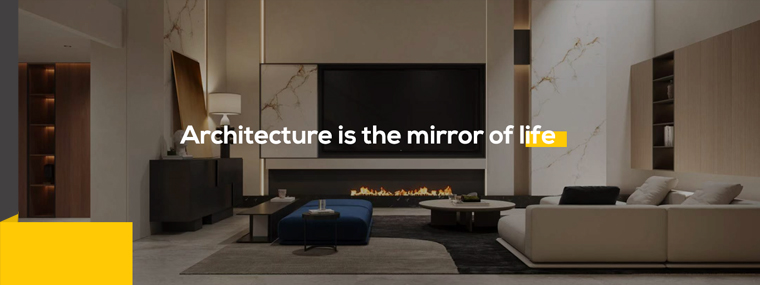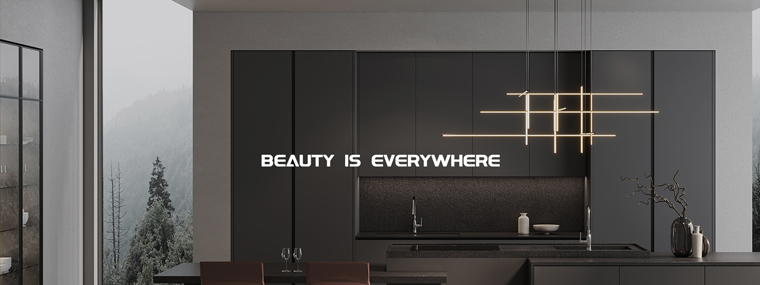Q: What is porcelain?
A: Porcelain is a type of large-format ceramic material made from
natural raw materials. It is produced using a special process involving presses with a capacity of over ten thousand tons, combined with
advanced manufacturing techniques and fired at temperatures above
1240°C. Therefore, porcelain exhibits excellent hardness, abrasion
resistance, and decorative qualities. They can withstand processes such as cutting, drilling, and polishing.
Q: What are the advantages of porcelain? A: Porcelain has the following advantages:
1. Safety and Hygiene: They can come into direct contact with food, are
100% recyclable, non-toxic, non-radioactive, and environmentally friendly.
2. Fire and High-Temperature Resistance: They do not deform when
exposed to high temperatures. Porcelain has an A1 fire rating and do
not undergo significant physical changes (such as shrinkage,
cracking, or discoloration) when exposed to flames at 2000°C. They also do not emit gases or odors.
3. Stain Resistance: They have an extremely low water absorption rate
(0.002%), so stains cannot penetrate, and there is no space for bacterial growth.
4. Scratch Resistance: They have a Mohs hardness of 6.
5. Corrosion Resistance: They resist various chemical substances,
including solutions and disinfectants.
6. Ease of Cleaning: Cleaning only requires a damp cloth, with no
special maintenance needs, making it simple and quick.
7. Versatile Application: They break the boundaries of decorative
materials and extend into functional applications, offering diverse design, processing, and application possibilities that meet high
standards.
8. Customisable: Porcelains come in a variety of patterns and colors
and can be customised according to the user’s needs.
Q: What are the main applications of porcelain in decoration? A: Porcelain can be used in many applications:
1. Mobile Furniture: dining tables, coffee tables, side tables, TV
cabinets, and storage cabinets etc.
2. Integrated Bathrooms: bathroom cabinets, walls, floors, and shower
rooms etc.
3. Custom Applications: kitchen islands, cabinets, wardrobes,
countertops, and bay windows, etc.
4. Interior/Wall Surfaces: background walls, flooring, and wall surfaces
etc.
5. Outdoor use: gardens, exterior, walls etc.
Q: What are the differences between porcelain and natural stone?
A: There are a number of differences between porcelain and natural stone:
1. Main Components: Porcelains are primarily made from natural stone
powder and long-term stone, processed through a special firing process.
2. Radiation: Porcelains are processed later and do not produce
radiation.
3. Hardness: Porcelains have a Mohs hardness exceeding 6, providing
strong impact resistance and a low damage rate.
4. Corrosion Resistance: Porcelains, processed later, show significant
improvement in resistance to various chemicals, including solutions and disinfectants.
5. Ease of Cleaning: Porcelains, after processing and surface polishing,
have a clear surface texture. They are pressed with a press of over ten thousand tons, resulting in high density.
6. Stain Resistance: Porcelains, pressed with over 36,000 tons and
using NDD technology, and fired at temperatures above 1200°C, have a precise surface glaze, low water absorption, and good stain resistance.
A: Porcelain is a type of large-format ceramic material made from
natural raw materials. It is produced using a special process involving presses with a capacity of over ten thousand tons, combined with
advanced manufacturing techniques and fired at temperatures above
1240°C. Therefore, porcelain exhibits excellent hardness, abrasion
resistance, and decorative qualities. They can withstand processes such as cutting, drilling, and polishing.
Q: What are the advantages of porcelain? A: Porcelain has the following advantages:
1. Safety and Hygiene: They can come into direct contact with food, are
100% recyclable, non-toxic, non-radioactive, and environmentally friendly.
2. Fire and High-Temperature Resistance: They do not deform when
exposed to high temperatures. Porcelain has an A1 fire rating and do
not undergo significant physical changes (such as shrinkage,
cracking, or discoloration) when exposed to flames at 2000°C. They also do not emit gases or odors.
3. Stain Resistance: They have an extremely low water absorption rate
(0.002%), so stains cannot penetrate, and there is no space for bacterial growth.
4. Scratch Resistance: They have a Mohs hardness of 6.
5. Corrosion Resistance: They resist various chemical substances,
including solutions and disinfectants.
6. Ease of Cleaning: Cleaning only requires a damp cloth, with no
special maintenance needs, making it simple and quick.
7. Versatile Application: They break the boundaries of decorative
materials and extend into functional applications, offering diverse design, processing, and application possibilities that meet high
standards.
8. Customisable: Porcelains come in a variety of patterns and colors
and can be customised according to the user’s needs.
Q: What are the main applications of porcelain in decoration? A: Porcelain can be used in many applications:
1. Mobile Furniture: dining tables, coffee tables, side tables, TV
cabinets, and storage cabinets etc.
2. Integrated Bathrooms: bathroom cabinets, walls, floors, and shower
rooms etc.
3. Custom Applications: kitchen islands, cabinets, wardrobes,
countertops, and bay windows, etc.
4. Interior/Wall Surfaces: background walls, flooring, and wall surfaces
etc.
5. Outdoor use: gardens, exterior, walls etc.
Q: What are the differences between porcelain and natural stone?
A: There are a number of differences between porcelain and natural stone:
1. Main Components: Porcelains are primarily made from natural stone
powder and long-term stone, processed through a special firing process.
2. Radiation: Porcelains are processed later and do not produce
radiation.
3. Hardness: Porcelains have a Mohs hardness exceeding 6, providing
strong impact resistance and a low damage rate.
4. Corrosion Resistance: Porcelains, processed later, show significant
improvement in resistance to various chemicals, including solutions and disinfectants.
5. Ease of Cleaning: Porcelains, after processing and surface polishing,
have a clear surface texture. They are pressed with a press of over ten thousand tons, resulting in high density.
6. Stain Resistance: Porcelains, pressed with over 36,000 tons and
using NDD technology, and fired at temperatures above 1200°C, have a precise surface glaze, low water absorption, and good stain resistance.
PRODUCTS SEARCH




